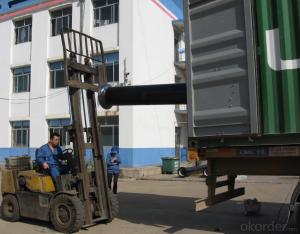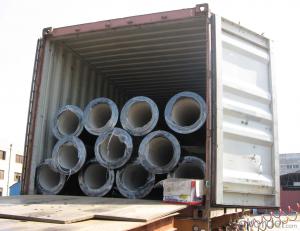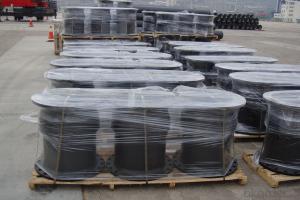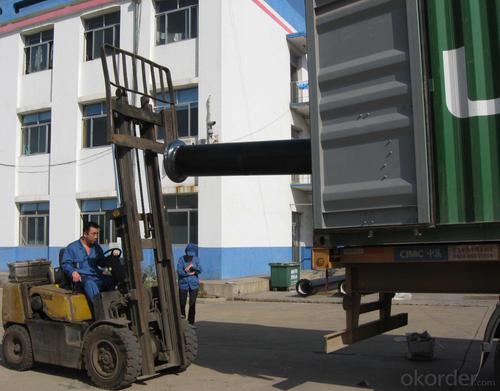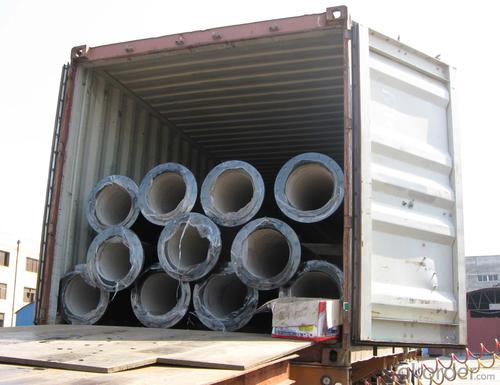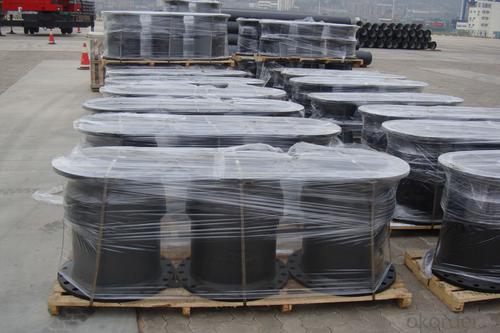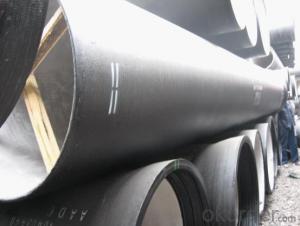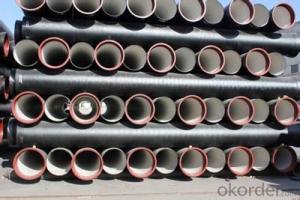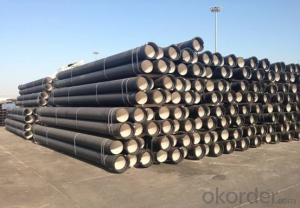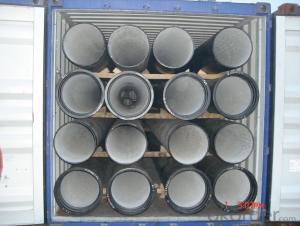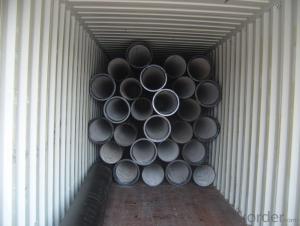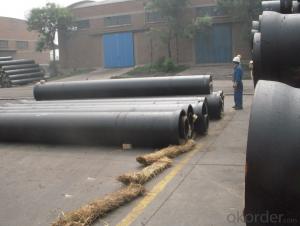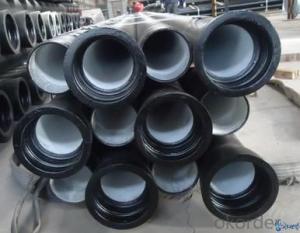DUCTILE IRON PIPES K8 DN250
- Loading Port:
- China Main Port
- Payment Terms:
- TT OR LC
- Min Order Qty:
- -
- Supply Capability:
- -
OKorder Service Pledge
OKorder Financial Service
You Might Also Like
Ductile Iron Cast Pipe is without any defects compare with tradition casting tech, which has many advantages particularly as follow:
(1) High density. In the "vertical upward casting" process, the melt iron of centre liquid column in center crystallizer is continuously feeding for volume shrinkage caused by condensation tube at outer circumference , which lead to be free of shrinkage porosity.
(2) High purity. When melt iron pouring, the mixed impurities such as gas, dross, sand grain which are lighter than melt iron could be eliminated at furnace mouth, its impossible to enter into the crystallizer through the channel, so the melt iron into the crystallizer is very pure.
(3) Strength with toughness. The cooling speed provided by continuous crystallizer is 30 times than sand casting and 5 times than centrifugal casting, and doesn't produce white iron, the eutectic cell volume of continuous cast iron is one eighth to one tenth compare with traditional cast iron. The density of graphite nodule in ductile iron can reach 300-700 pcs/mm2. Therefore, all reason above improve the strength and toughness of continuous cast iron.
(4) Free machining. The high speed cooling make the hardening phase (such as boride, steadite) not appear like reticular, massive or thick, but diffuse like fish bone and pane in shape, moreover, there are tiny graphite flakes inlaid hardening phase. It's free machining in BrinellHardness the range of 250-300HB. However, the Brinell Hardness of 250 is top limit to common metal materials.
(5) Uniform composition of tube wall. The convection mixing of liquid column caused by marching type drawing in crystallizer make the composition of tube wall well-distributed, and concentration gradient very little.
(6) High productivity. To the wall thickness of tube under 10mm, the speed of continuous casting is 1 meter/min, to the wall thickness of tube under 20mm, the speed of continuous casting is 0.5 meter/min, which is high efficiency that centrifugal or other casting tech couldn't reach.
- Q: What are the different types of coatings available for ductile iron pipe?
- Ductile iron pipe offers a range of coating options, each with its own unique properties and benefits. 1. One commonly used coating is cement mortar. It involves applying a layer of cement mortar to both the interior and exterior surfaces of the pipe. This coating protects against corrosion and abrasion, while also improving hydraulic efficiency. 2. Another popular choice is polyethylene encasement. This involves wrapping the pipe with a layer of polyethylene material. It provides excellent corrosion resistance, especially against soil and water contaminants. 3. Fusion-bonded epoxy (FBE) coating is applied by heating epoxy powder to create a strong bond with the pipe surface. It offers outstanding corrosion resistance and is commonly used in aggressive environments like wastewater treatment plants and chemical processing facilities. 4. Zinc coating, also known as galvanization, is applied by adding a layer of zinc to the pipe's surface. It provides excellent corrosion resistance and is often used in outdoor applications exposed to moisture and humidity. 5. Bituminous coating is a black, tar-like substance that protects against corrosion. It is commonly used in underground applications where the pipe is in contact with soil or water. 6. Polyurethane coatings are known for their resistance to abrasion, impact, and chemical corrosion. They are often used in aggressive environments such as oil and gas pipelines. These examples highlight the different coatings available for ductile iron pipe. The choice of coating depends on factors like the intended application, environmental conditions, and desired level of corrosion protection. It is crucial to consult industry experts and follow relevant standards and specifications when selecting a coating for ductile iron pipe.
- Q: What is the relationship between continuous cast iron pipe and ductile iron pipe?
- Cast iron pipes are divided into continuous cast iron pipes and centrifugal cast iron pipes according to different casting methods. They are divided into gray cast iron pipes and ductile iron pipes according to different materials.
- Q: Method for cutting cast iron pipe
- I don't know the diameter and length of the cast iron tube. The small diameter can be made of a huge bed. The short one can also be lathe. The lathe is very flat
- Q: What are the different methods for anchoring ductile iron pipe?
- Depending on the specific application and requirements, there are various methods available for anchoring ductile iron pipe. One method involves the construction of concrete thrust blocks around the pipe at points where there are changes in direction or diameter. These blocks resist the thrust forces from the flowing water and prevent pipe movement. Another option is to install concrete collars or rings at regular intervals along the pipe. These collars provide additional support and prevent lateral movement. They are created by pouring concrete into a pre-made mold surrounding the pipe. Pipe clamps are metal brackets that can be attached to the pipe and anchored to a structure or support system. They come in different sizes and designs, allowing for flexible installation and adjustment as needed. Pipe restraints are specifically designed devices to restrict the movement of ductile iron pipe. Typically, they consist of a metal band or collar tightened around the pipe and attached to a concrete structure or anchoring system. The bell and spigot joint itself can serve as a means of anchoring the pipe. The bell end of one pipe fits over the spigot end of another, creating a tight connection that resists movement. Properly compacted soil surrounding the pipe can also provide some level of anchoring. The soil should be compacted in layers around the pipe to ensure stability and prevent movement. It is important to consider factors such as soil conditions, pipe diameter, operating pressure, and location when selecting the appropriate anchoring method. Consulting industry standards, guidelines, and a qualified engineer is crucial in determining the best anchoring method for a specific ductile iron pipe installation.
- Q: What are the disadvantages of using ductile iron pipe?
- Some of the disadvantages of using ductile iron pipe include its relatively high cost compared to other materials, its susceptibility to corrosion over time, and its heavy weight which can make installation more challenging. Additionally, ductile iron pipe may require more maintenance and repairs due to potential cracking or leaking.
- Q: What is the excavation width of ductile iron pipes with diameters greater than 1400?
- When the condition does not allow enough slope, it is necessary to do wall protection and other means to ensure safetyRemind me, such a big pipe, dig deep in two ways. One is the depth diameter (range at the junction of 1.6 m in length and 500 for manholes and operation. The lower bolt assembly when) there is a depth diameter plus 500. and then in the trench laying branch the pier, installed after the fine stone tamped backfill.Can also be buried directly with the pipe diameter, and then put into the assembly. This method requires a large space on the ground, otherwise, the volume is too large after assembly, weight is too heavy, may cause damage to the pipeline and personnel injuries
- Q: Can ductile iron pipes be used for underground utilities?
- Yes, ductile iron pipes can be used for underground utilities. Ductile iron pipes are known for their durability, strength, and resistance to external pressure. This makes them a suitable choice for underground applications where the pipes need to withstand heavy loads, such as those found in utility installations. Ductile iron pipes are also resistant to corrosion, which is important for underground environments where the pipes are exposed to moisture and soil conditions. Additionally, these pipes have a longer service life compared to other materials, reducing the need for frequent replacements and maintenance. Therefore, ductile iron pipes are commonly used for underground utilities such as water distribution, sewage systems, and gas pipelines.
- Q: Are ductile iron pipes suitable for underground river crossings?
- Indeed, underground river crossings can be facilitated by the use of ductile iron pipes. Ductile iron, being a robust and long-lasting material, can endure the external stresses and burdens encountered in such crossings. With its superb tensile strength, impact resistance, and durability, ductile iron is exceptionally well-suited for underground applications where the pipes may face elevated water pressure, ground displacement, or various environmental influences. Furthermore, ductile iron pipes possess an extended lifespan and are impervious to corrosion, a vital attribute when dealing with water crossings. Their capacity to withstand these circumstances renders them a dependable choice for underground river crossings.
- Q: What is the difference between a cast iron pipe and a ductile iron pipe?
- Nodular cast iron has high strength and strong plasticity. The tensile strength of ductile iron is twice that of gray iron, and the yield strength even exceeds that of cast steel.
- Q: How are ductile iron pipes protected during transportation and storage?
- Ductile iron pipes are protected during transportation and storage through various methods to ensure their integrity and prevent any potential damage. Firstly, these pipes are typically coated with a protective layer, such as epoxy or zinc, which acts as a barrier against corrosion. This coating helps to safeguard the pipes from moisture and other corrosive elements during transit and storage. Additionally, ductile iron pipes are often bundled together and secured with straps or bands to prevent any movement or shifting that could lead to mechanical damage. This bundling also makes it easier to handle and transport the pipes in a more organized manner. During transportation, the pipes are usually loaded onto pallets or placed in crates to provide added protection and stability. This helps to minimize the risk of any accidental impact or rough handling that could potentially cause cracks or fractures. Furthermore, proper labeling and marking of the pipes is essential to ensure that they are handled appropriately. This includes displaying handling instructions, weight limits, and pipe specifications, which helps prevent mishandling and damage during transportation. Moreover, storage conditions are crucial to maintaining the integrity of ductile iron pipes. They should be stored in a clean, dry, and well-ventilated area to prevent exposure to moisture and humidity. Pipes should be kept away from direct sunlight and extreme temperatures to avoid any potential degradation of the protective coating. In conclusion, protecting ductile iron pipes during transportation and storage involves applying protective coatings, bundling and securing them, utilizing appropriate packaging materials, ensuring proper handling and labeling, and storing them in suitable conditions. These measures aim to maintain the quality and structural integrity of the pipes, ensuring they arrive at their destination in optimal condition.
Send your message to us
DUCTILE IRON PIPES K8 DN250
- Loading Port:
- China Main Port
- Payment Terms:
- TT OR LC
- Min Order Qty:
- -
- Supply Capability:
- -
OKorder Service Pledge
OKorder Financial Service
Similar products
Hot products
Hot Searches
Related keywords
